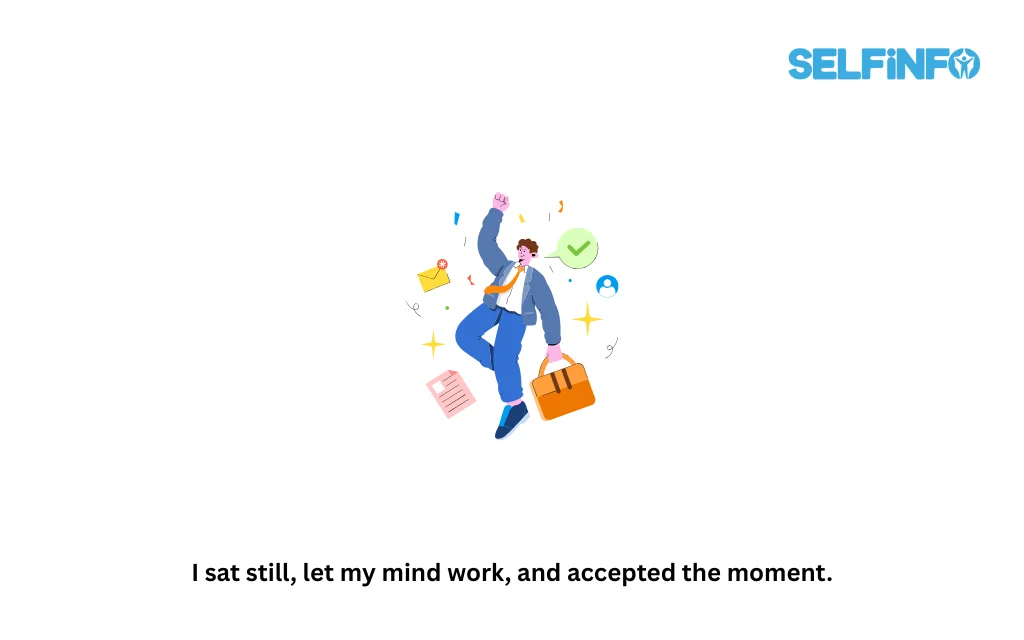Busy mind or not, I’ve been meditating and embracing the waking process for years, always on the lookout for signs that guide the way. Many of my teachers have been children, so I stay open to wisdom from any source.
We may engage in mindfulness and meditation for a variety of reasons. All meditators, regardless of their particular reason, occasionally encounter mental rebellion and distraction, which may be very annoying. Before they experience the results of their efforts, many novice meditators give up because they can not overcome their irritation.
I never had a professional meditation instructor, but I was absorbed with the practice of meditation from a pretty early age.
Luckily for me, I was able to overcome distraction and mental rebellion during meditation and in everyday life thanks to a lesson I learnt from an unexpected teacher pretty early in the process. In order to assist you get more out of life and meditation, I would like to share this lesson with you.
For weekend walks, picnics, and dog walks, my wife would frequently go to a big park in Tokyo. I was unintentionally taught by a young Japanese girl one day at the park.
One Sunday, we had decided to go to a picnic with a buddy, Yuuji. We came our dogs, and Yuuji brought his wife and his kid, Kotomi, who is eight years old.
Leila, one of our dogs, is a petite breed of Chinese crested dog. We let Kotomi take the lead for Leila since she had a deep affection for dogs and wanted to walk one of ours.
When Kotomi went for her first dog walk, she was ecstatic! Leila would also be out for her first stroll with an unfamiliar person.
Kotomi learned how to grasp the leash, how to keep Leila by her side when walking, and other skills from my wife. After listening, Kotomi nodded in agreement.

Even though our tiny Leila was usually a pleasure to walk with, she gave me a disbelieving look when my wife gave Kotomi the leash. This was obviously going to be a conflict between wills.
Leila completely disregarded Kotomi’s advice and started smelling everywhere she pleased. Leila’s weight on the leash caused Kotomi to lose all skill as she leaned into the walk and tugged the leash over her shoulder.
Leila bucked against the girl and leaned back against the leash, refusing to bow to this stranger. Kotomi continued to walk as though Leila had never been there.
Leila was not in any bodily danger, yet I still felt sorry for her. As is sometimes the case with dogs who have never been walked by anybody but family, she was testing her new walker. I was curious and wanted to see how this situation would develop.
Leila fought hard, but it was all in vain because Kotomi did not appear to notice. She simply could not wait to get to the park. She had a dog on the other end of the leash, and I wondered whether she had forgotten.
Kotomi simply stepped forward while the dog struggled.
I started to question how long Leila could continue to fight after five minutes. Leila remained in resistance mode for ten minutes, so I thought of taking the leash myself. Then Leila joined the walk, as if a light switch had been flipped.
She instantly gave in to Kotomi and started grinning as she strolled alongside her new buddy. She was the ideal dog for the remainder of the day. She let Kotomi, the first stranger to successfully take her up, sniff and even wagged her tail.
She never even participated in the fight that Kotomi had won! She simply walked forward without thinking.

Following this encounter, I started using the “forward momentum” approach in my meditations, with remarkable results. Simply put, I let up of any hope that my thoughts would cooperate and just kept going.
How does meditation apply the principle?
Meditation may be like that: The mind keeps getting sidetracked. The mind may cling to certain physical aches and pains. Statements like “I am not doing this right,” “I have too much mental noise,” or “I do not feel like meditation now, so I will do it tomorrow instead” are then the first signs of mental resistance.
However, this is the only moment we will ever have! There has never been and never will be a tomorrow. There is no such thing as it. We are either making progress right now or we are not.
I chose to sit in meditation for the designated amount of time, regardless of how I felt about it, in order to accept the truth of the moment. Distraction and frustration were not going to have any influence over me. I made the decision to let my head do the heavy lifting while I

I was reminded of things I already knew while my mind was preoccupied with work-related concerns. This is what took place.
“Have you looked for grammatical problems in the tests?” I inhaled deeply, stiffened and relaxed my entire body, broadening my consciousness on a global scale.
“Remember to print the tests as soon as possible tomorrow morning!” I relaxed once again, expanding my consciousness in all directions and delving even further into tranquility.
“Do not forget to…” I relaxed into space in the middle of my statement.
I started noticing that whenever a thought occurred, my mind would start to ramble in frustration, saying things like, “Jeez, another thought,” “Ah, again,” or “When is this going to stop?” After realizing that my response thoughts are also thoughts, I made the decision to unwind and broaden my perspective whenever this happened.
Secondary thought stopped after a few minutes of expansive release, but the dissatisfaction that came with primary ideas persisted. I then infused my breath-releases with emotions.
Soon, the concept seemed distant. Thought was still happening, but I did not feel like it was mine.
After a while, overt thought and emotion completely stopped, and the breath-release-expansion proceeded with every distant thought.
All that remained were brief, unstructured bursts of emotion and thinking. Like little ripples in the stream of awareness, they emerged from the unconscious.
A sudden understanding of how the mind functions emerged. These little lapses are the starting point of thought, which the mind responds to automatically by connecting them with memories to form stories, narratives, and visuals that draw attention away from the here and now.

Finding a weak-willed con artist behind the controls was akin to peeking behind the curtain in The Wizard of Oz. It broke a crippling delusion.
Silence.
The lesson of progress was successful! I advanced, step by step, into an eternal clarity that was only broken by a beeping alarm, much like Kotomi had done with each tiny step in the park. It was now thirty cool minutes.
Therefore, when you sit down to meditate, set a time limit for yourself and stay there for that duration, sinking deeper and deeper into expansiveness. Recognize that the mind will occasionally rebel and sniff. Simply keep going forward toward spaciousness through relaxed awareness.
Eventually, an unforeseen event might occur. The mind rapidly starts to follow your desire and becomes silent.
You can have another unexpected event after you quit battling your mind. You can also stop worrying about the thoughts, presumptions, opinions, stories, regrets, instant replays, and so on.
Fighting or correcting the mind is no longer necessary after direct experience has provided insight into it. When it gets tired of fighting, the dog will join you, and before you know it, you will have a new companion that is on your side.
